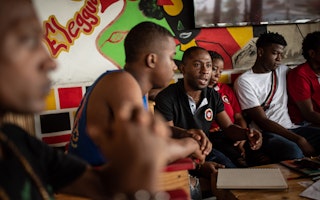Remembering the Romero Assassination
By David Holiday

Carlos Dada is the editor of elfaro.net, an online news outlet in El Salvador supported by the Open Society Foundations. I interviewed Dada via email about a recent 10,000-word article based on an exclusive interview with a former death squad member who participated in the assassination of Archbishop Oscar Romero.
On the 30th anniversary of the murder of Msgr. Oscar Romero, El Faro published a long piece based on months of research about the murder. Why did you decide to do this, and why is this important?
Archbishop Romero’s assassination while serving mass is the most transcendent homicide in the modern history of El Salvador. Even though everybody knew who did it, there has been a conspiracy by the state to block any investigation into this crime. In 1992, after the Peace Accords, the Truth Commission concluded that the leader and founder of the Salvadoran rightist party ARENA, Roberto D’Aubuisson, was the author of this crime, but no judicial action in El Salvador was taken against him or any of his inner security circle. ARENA ruled El Salvador from 1989 until last year.
In 2005, a group of lawyers based in San Francisco, California, opened a civil trial on behalf of Archbishop Romero's family against Alvaro Saravia, who was then living in California. The jury found Saravia guilty of a crime against humanity for the killing of Romero, but he never showed up at the trial and subsequently disappeared.
I found him two years ago, in hiding, and began a series of long conversations with him in order to get his confession and help clarify the crime. We didn’t plan for this story to be published for the 30th anniversary of the murder, but as the conversations kept going and the anniversary came closer, we thought it would be a good opportunity to publish it. We then began to interview other people mentioned by Saravia to confirm his information.
Saravia’s confession is the first direct testimony of the participation of Mr. D’Aubuisson in the murder, and the confirmation of others involved in the crime establishes a conspiracy to kill the Archbishop orchestrated by some of the historical figures of the Salvadoran right. Romero has become one of the most important Catholic figures in Latin America, and is regarded as a martyr and potential saint by millions. This explains why the story we published was considered of wide public interest and reproduced by many media throughout Latin America. Our website quickly crashed due to overwhelming reader traffic – over 70,000 hits in a two-day period.
How did El Faro’s coverage of the Romero anniversary compare to that of the mainstream media?
El Salvador’s mainstream media has traditionally been an instrument of a conservative elite that openly supported ARENA since its beginnings. They have been at the center of systematic efforts to minimize Archbishop Romero’s figure. This year, with a new government and a President who is an openly declared follower of Romero, mainstream media gave substantial coverage of the activities to commemorate the killing of Romero and celebrate his legacy. Nevertheless, nothing was said about the authorship of the assassination. There is, of course, a substantial difference between that and a special report that took more than a year to investigate, which is what we did.
Yes, we read in the US press about President Funes’ apology to the family of Romero for his assassination. But do you think there will ever be justice in this case?
In terms of a judicial process, I don’t know if we will ever see that happening in El Salvador. The Inter-American Human Rights Commission has resolved that El Salvador must investigate and bring to justice the people responsible for this crime. But President Funes has said on several occasions that it is not his role, rather that of the Attorney General, to investigate this case. Furthermore, it is not clear if there is legal ground still to do this in El Salvador.
In the end, justice is not necessarily established in a court. Judges and juries usually establish a judicial truth, but there is also an historical truth which can be established through journalistic investigations or academic research. And it also serves justice, in terms of delivering the message that no matter what, sooner or later, those guilty of heinous crimes will be found and given their rightful place in history—among the worst of us. It is another way to fight impunity.
Do you think that your story definitively clarifies how Archbishop Romero was killed?
Absolutely not. Most of that story is still yet to be known. We still don’t know who paid for the crime, who ordered D’Aubuisson to organize it, how he coordinated the plan with the other author – Mario Molina, the son of former President Arturo Molina – and, in a broader sense, how the death squads were organized and financed in El Salvador. Most of it remains to be investigated. But there are enough elements now to conclude that the state security forces were deeply involved in death squad and torture operations, and that they coordinated some operations with extreme rightist groups led by D’Aubuisson. Officials in all branches of the government and the army went to considerable lengths to prevent a serious investigation of this crime.
Most people are probably thinking, is it really safe to do this kind of reporting today in El Salvador? Have there been any repercussions for you, or for El Faro?
Most investigative reporting is not safe in El Salvador, but so far there have been no repercussions for anybody at El Faro because of this story.

Until November 2021, David Holiday was a unit manager in the Latin America Program at the Open Society Foundations.


